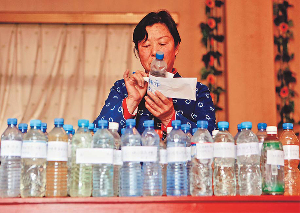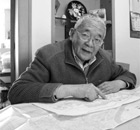Society
Green NGO drives change at grass roots
By Li Jing (China Daily)
Updated: 2010-04-20 07:18
 |
Large Medium Small |
After meeting with staff from China's leading environmental NGOs in 2001, she decided to set up her own in Henan.
"There were already some environmental NGOs at that time but mostly based in big cities like Beijing and Shanghai. I felt the rural areas also needed such organizations," said Tian.
|
||||
Starting out with just a dozen volunteers, the group began its pollution survey in Xinxiang in 2003, creating a comprehensive "pollution map". Two years later, the project was expanded along the Yellow River.
The group now boasts more than 3,000 members, including farmers, students, and workers.
Every year, the self-funded volunteers spent several months on inspections of polluting factories. They took pictures of discharges from plants, collected water near sewage inflow points, tested them and sent the results to local environmental protection bureaus.
"We have helped close more than 100 polluting factories," said Tian proudly. "I have become a common enemy of these enterprises."
The name Tian Guirong is now notorious in Xinxiang and neighboring counties. Whenever a factory is reported for illegal discharging of pollutants, many people in the region automatically believe she was the one who turned them in.
However, such enmity dealt her a huge blow in 2008 when she lost an election to keep her job as head of Fanling village.
Tian had served in the post for three years, winning support in 2005 thanks to her concept of "building a green village". It was a hard-won opportunity to experiment with and exemplify her sustainable management beliefs at the grassroots level. She vetoed polluting projects, cleaned up waterways, built a "green corridor" with tree planting and established a special water supply plan to teach villagers to save water.
She thought she was helping to restore the old, beautiful village of her childhood, but was in the end voted out by villagers who wanted those polluting enterprises.
"I had a good cry when I learned the result. Maybe I need to change some of my methods," she said.
The election defeat has allowed her to concentrate more on Xinxiang Environmental Protection Volunteers, which like most grassroots NGOs faces a constant fund-raising headache.
Over the past decade, Tian has invested 380,000 yuan ($55,000) of her own money into the organization. The only other funding it has received has come from several awards, including conservation and environmental grants from Ford, the automaker. Despite the hardships, she has never once contemplated giving up the fight.
Tian plans to launch a project to protect Taihang mountain this year. She claims some illegal cement plants are quarrying on the mountains and causing extensive damage to the ecology.
Listening to citizen experts
While grassroots NGOs continue to confront polluting plants in the countryside, some educated elites are also attempting to use their expertise to push the environmental protection message in the cities.
Amid repeated protests over the construction of incinerators in metropolises like Beijing, Shanghai and Guangzhou, a team of volunteers in the capital's Aobei residential community has been campaigning for the central government to adopt its policy proposal on garbage treatment since last November.
The 25,000-word proposal, the first of its kind from Chinese citizens, followed months of research, which included analyses of scientific studies, interviews with environmental experts and media professionals, and public consultations. The draft was revised three times before it was sent to the authorities.
|
 |
|
Tian Guirong tags bottles containing samples she and her team collect from diff erent water sources around the rural areas in Henan province.
|
"Our society has entered an era when the public pursues knowledge about environmental protection consciously," said Feng Yongfeng, one of the founders of Green Beagle, a Beijing-based NGO that aims to advocate popular science among the public. "Like Aobei group, we are likely to see more citizen experts and journalists find out more about the environment we're living in."
The public is no longer satisfied with easy steps, such as turning off lights in empty rooms or not using plastic bags, he said. "They want to know how their life is impacted by potential pollutions."
One "citizen expert" is Cheng Jing, a 39-year-old electronic engineer in Beijing who has become an unofficial authority on electrical and magnetic radiation.
He tested radiation levels at several spots in his community last year as both he and his neighbors feared they were being exposed to dangerous radiation from a nearby cellphone transmission tower and power line. Using a surveymeter bought on taobao.com, a popular online shopping website, the result was assuring: the levels of radiation were far below the safety guidelines.
"The result may not be 100 percent accurate because I'm not using precision equipment but it still can provide reliable references for our purpose," said Cheng.
Last year, Cheng was invited by a dozen residential communities to carry out similar tests. Some citizens even have home appliances like microwave ovens and LCD televisions tested, he said.
(China Daily 04/20/2010 page1)







